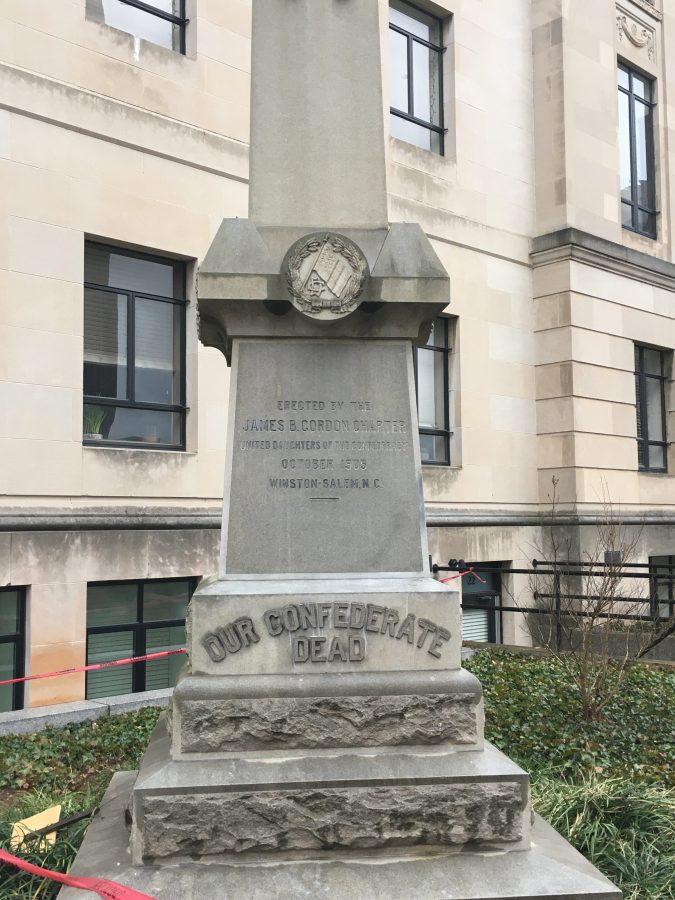
On Tuesday, Jan. 22, a group of Winston-Salem residents and students gathered at the City Council chambers to voice their opinions about the statue of the Confederate soldier that stands in downtown Winston-Salem.
Members of the group Hate Out of Winston spoke during the 30-minute public comment period of the City Council meeting. During this period, citizens can personally address City Council members and voice any concerns about the operations of the city government.
According to the group’s Facebook page, the goal of the Pack City Council event was to place continued pressure on the city government to remove the statue from downtown following the city’s mandate for the statue’s owner to relocate it. In addition to advocating for the removal of the statue, the group also plans on fighting for local change around issues such as affordable housing, gentrification and education.
Senior Alec Jessar belongs to the Hate Out of Winston group and was involved in helping to coordinate the Pack City Council event. While Jessar was unable to attend Tuesday’s city council meeting, he does believe that the removal of the statue is a step in the right direction for Winston-Salem.
“To me, the statue represents that racism still very much exists in Winston-Salem and in this country,” said Jessar.
Alexx Andersen, a graduate student in the Wake Forest School of Divinity, attended Tuesday’s meeting and was one of the attendees who shared their feelings about the statue with the city council. Andersen was one of many speakers who voiced their support for the removal of the statue from the downtown location, yet expressed the belief that Winston-Salem’s racial divisions will not fully heal with its removal.
Winston-Salem resident Megan Anderson, who also spoke before the council, agreed.
“I would love to see the statue come down but what I really want to see is the breaking down of systemic racism that presents itself in the lack of quality public transportation and over-policing in poor neighborhoods,” said Anderson.
The James B. Gordon chapter of the United Daughters of the Confederacy (UDC) erected the Confederate statue in 1905. Today, the statue sits on a small plot of privately-owned land beside the old Forsyth County Courthouse that has been converted into apartments. The UDC is also responsible for helping to construct the “Silent Sam” statue that once stood on the campus of the University of North Carolina at Chapel Hill.
In December, Winston-Salem City Attorney Angela Carmon ordered the UDC to “remove and relocate” the statue to “a more secure location.” In a letter sent to the UDC, the city states that the group must remove the statue from its current location before Jan. 31. If the UDC does not remove the statue before this deadline, the city has threatened to file a lawsuit against the group.
In response to the letter from the city, the UDC issued a statement on Jan. 3 vowing to fight for the preservation of the statue in its current location. “We wish for the memorial to remain in its place … and will do everything in our power to see that it continues to remain,” said the statement.
The city’s proposed new home for the statue is Salem Cemetery, where 36 Confederate soldiers are buried. Winston-Salem Mayor Allen Joines supports the relocation of the statue to this site and has offered to finance the movement of the statue to this location. Mayor Joines has also stated that any movement of the statue to the cemetery would be a “quiet and serene” event.
Tuesday’s Pack City Council event comes in the wake of developments regarding the future of the Confederate statue that stood on the campus of the University of North at Chapel Hill until protesters toppled the statue in August.
Last week, UNC-Chapel Hill Chancellor Carol Folt announced that she would resign at the end of the 2018-2019 academic year. In her statement of resignation, Chancellor Folt ordered that the base and commemorative plaques of the Silent Sam statue be removed from the school’s campus.
“The presence of the remaining parts of the monument on campus poses a continuing threat both to the personal safety and well-being of our community and to our ability to provide a stable, productive educational environment,” said Folt in her resignation statement.